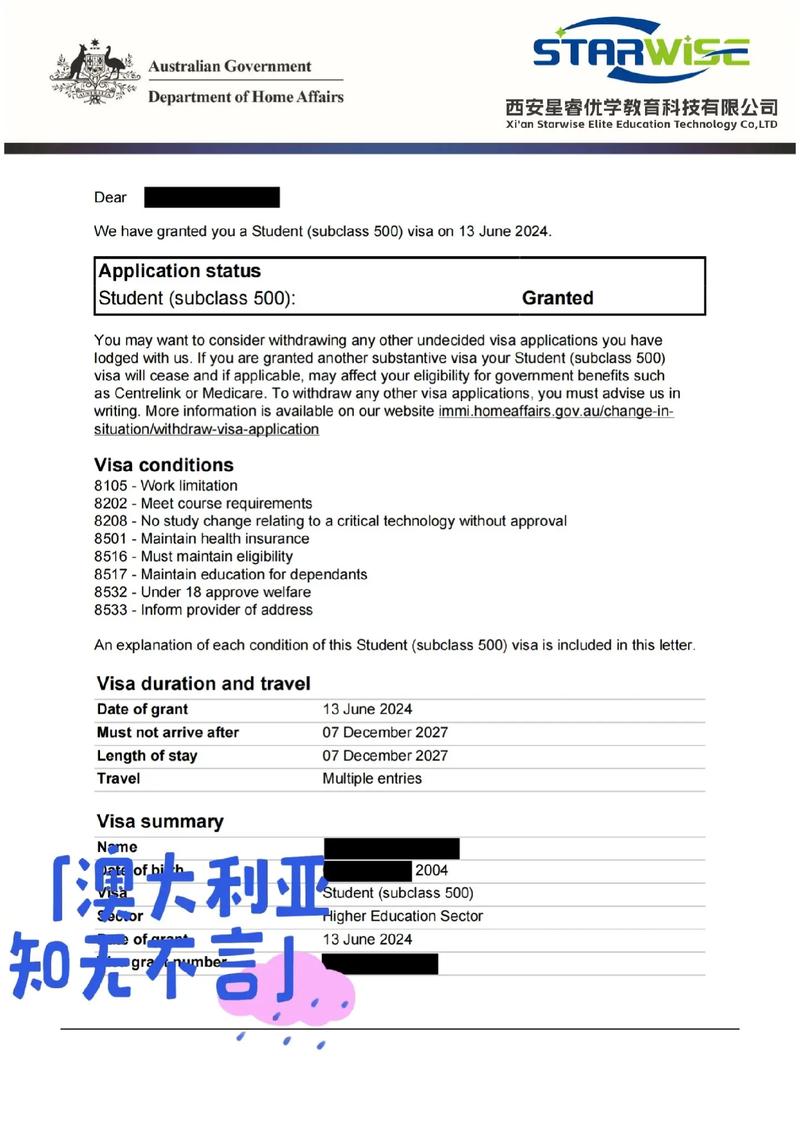恭喜您!收到澳洲签证是一个好消息,意味着您的签证申请已经成功获批。

(图片来源网络,侵删)
您需要仔细核对签证信息,并做好出行前的准备,以下是详细的步骤和建议,请务必逐项核对:
第一步:仔细核对签证信(Grant Notice)
这是您收到的最重要的文件,请务必逐项检查,确保所有信息准确无误。
签证基本信息:
- 签证类别: 确认是您申请的签证类型,
- 600类别 - 访客签证 (旅游、探亲、商务)
- 500类别 - 学生签证
- 485类别 - 毕业生工作签证
- 408类别 - 临时活动签证
- 签证号码: 请妥善保管,这是您签证的唯一标识。
- 签证生效日期: 您可以合法进入澳大利亚的最早日期。
- 签证到期日期: 您必须在或之前离开澳大利亚的日期。请特别注意这个日期,不要逾期滞留。
- 允许入境次数:
- Single (单次): 只能入境一次。
- Multiple (多次): 在签证有效期内可以多次往返,即使多次入境,每次停留的时间也由签证上的 "Stay Until" 决定。
- 每次停留期限: 每次入境后,您被允许在澳洲停留的时间长度。
申请人个人信息:

(图片来源网络,侵删)
- 姓名、护照号码、出生日期、国籍 等个人信息是否与您的护照完全一致,任何一个字母或数字的错误都可能导致入境问题。
特殊条款/条件: 这部分至关重要,请务必仔细阅读,常见的条款包括:
- 8501 - 健康要求: 您在澳洲期间必须保持购买符合要求的海外访客健康保险,如果您的签证是600类别旅游签证,这个条款是强制性的,请确保您的保险覆盖整个停留期。
- 8516 - 工作权利限制: 对于访客签证,通常不允许工作,请确认您的签证是否允许工作,以及是否有工作时长的限制。
- 8532 - 真实停留意图: 您必须遵守签证条款,在签证到期时离开澳洲。
- 其他条款: 可能会注明您需要联系移民局或提供额外信息的条款。
护签页:
- 如果您递交了护照进行贴签,请检查护照上的签证贴纸信息是否与签证信上的信息完全一致。
第二步:签证获批后的必要准备
保存好所有文件:
- 将签证信(PDF或纸质版)和护照(如有贴签)扫描或复印一份,与您的其他旅行文件放在一起。
- 原件请妥善保管,出行时随身携带。
购买合适的保险:

(图片来源网络,侵删)
- 如果签证上有 8501 条款,请立即购买符合澳洲政府要求的 OVHC (Overseas Visitor Health Insurance),保险公司必须是澳洲政府认可的,且保险额度要足够。
安排行程和住宿:
- 根据签证的有效期和停留期限,规划您的澳洲行程。
- 预订好往返机票和住宿,虽然移民局不强制要求提供,但准备好行程单和酒店订单,在入境时可能会被海关官员要求出示,以证明您的旅行目的。
准备入境材料:
- 护照(有效期需足够长)。
- 签证信打印件。
- 往返机票电子行程单。
- 酒店预订单或邀请函(如果适用)。
- 资金证明(如现金、信用卡、旅行支票等,证明您有能力支付在澳洲的开销)。
- OVHC保险单(如果适用)。
第三步:入境澳大利亚
- 诚实回答问题: 入境时,澳洲边境执法官员会问您一些问题,
- 您来澳洲的目的?
- 您计划停留多久?
- 您住在什么地方?
- 您如何支付在澳洲的费用? 请根据您的真实情况和签证目的,如实、自信地回答。
- 出示材料: 如果官员要求,请出示上述准备好的入境材料。
- 遵守签证条款: 入境后,请务必遵守签证上的所有条款,尤其是停留期和8501条款(保险要求)。
重要提醒
- 签证信息查询: 您可以在澳洲内政事务部的官网 ImmiAccount 中登录查看和管理您的签证信息。
- 护照有效期: 请确保您的护照在您计划离开澳大利亚后仍有至少6个月的有效期,否则可能会影响您的出行。
- 签证更新: 如果您的个人信息(如护照、姓名)发生变更,或者您想延长停留时间,您需要及时向澳洲移民局申请签证变更或续签。
再次恭喜您!祝您旅途愉快,在澳洲有一段美好的经历!


